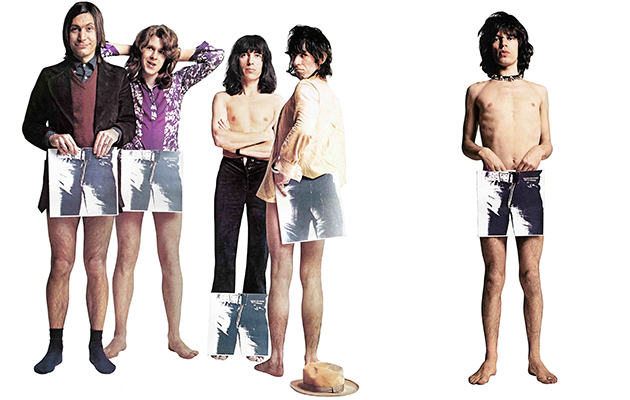The Stones’ debut album on their own label didn’t just become their first to top both the British and American charts. Sticky Fingers symbolised the new, brashly decadent culture into which rock was moving as the ’70s dawned. Its Anglo-American musical heritage was spiced with hints of hard drugs and demi-monde celebrity – afforded by an Andy Warhol-designed cover featuring a bulging male crotch begging to be unzipped.
This reissue of Sticky Fingers features the 2009 remastered album alongside an additional disc of five alternate takes and five live cuts from the Roundhouse in 1971. On the deluxe edition, a third disc adds the Leeds date from the 1971 tour – widely bootlegged as Get Your Leeds Lungs Out! – in its entirety.
The live material, performed before the new album was released, displays a band emboldened by the input of new guitarist Mick Taylor, on a set leaning heavily on Let It Bleed. With Nicky Hopkins prominent on piano, the Roundhouse “Live With Me” is looser and raunchier than the album version, and Taylor contributes neat, wheedling solos to “Stray Cat Blues” and “Love In Vain”, while the Leeds take of the latter is just superb, conveying true blues pain. Versions of “Midnight Rambler” from both venues shift confidently through gears, swinging like mad as they stretch out to between 11 and 13 minutes.
But it’s Sticky Fingers itself that still impresses most, the power of its blend of grit and sophistication undiminished nearly half a century on, in a beguiling union of country and city, the raw and the cooked. Keith Richards’ opening “Brown Sugar” riff heralds the quintessential Stones loose/tight groove, and Mick Jagger’s vocal seethes with lascivious menace. The alternate version, meanwhile, shows a song still en route to perfection, with slide guitar diminishing the chunky impact of the intro, and Bobby Keys’ sax solo truncated to accommodate a guitar break – apparently from Eric Clapton. And there’s as yet no closing “Yeah!/Yeah!/Yeah!/Wooo!” chant, the final additional hook that brings the song home.
The new Uncut is also available to buy digitally
Like “Brown Sugar”, “Wild Horses” was one of the tracks recorded at Muscle Shoals, bringing the Stones’ bluesy mettle to the West Coast country-rock style. It’s one of Jagger’s best vocal performances, the aching vulnerability of his delivery set off beautifully by the tragic warmth of the chorus harmonies, paralleling the way the delicate lead guitar dances through the plangent acoustic strumming. On the outtake, there’s no lead guitar, but some nice acoustic harmonic picking set against 12-string. It’s the first of what Jagger acknowledges is a large complement of slower material that includes “I Got The Blues”, a brooding country-soul number in Otis Redding style; the country-blues staple “You Gotta Move”. The eerie “Sister Morphine”, dates from the Let It Bleed sessions, with Ry Cooder’s haunting slide guitar casting shivers through the song, backed up by Jack Nitzsche’s extraordinary, atmospheric piano. It’s almost a travesty, albeit a relief, when it’s followed by the corny country parody of “Dead Flowers”, where the drug theme is more ironically weighted via a reference to being “in my basement room with a needle and a spoon”. The outtake version is, if anything, even more excessively cartoonish, Jagger hamming it up terribly with an uptight cowboy drawl. Ironically, it’s since become one of the album’s most covered songs, not least by mainstream country artists with, one hopes, a sense of humour.
Despite the overall downtempo character, Sticky Fingers doesn’t seem an underpowered album thanks to the potency of the rockier tracks. “Bitch” has a great rolling power, with the riff’s funked-up Chuck Berry groove punched home by louche horns. Keith Richards peels off one of his best lead lines, and Charlie Watts adds a masterstroke with his tom-tom flourish as Jagger delivers the line “my heart is beating louder than a big bass drum”. The alternate version is more than two minutes longer than the album cut, but save for a few lewd sax honks, remains substantially the same. Elsewhere, the languid grace of the opening riff to “Can’t You Hear Me Knocking” is so engagingly funky that you don’t really notice how the tempo drops for the Santana-style jazz-rock breakdown section underpinned by the keyboard dream-team of Nicky Hopkins’ piano and Billy Preston’s organ. The alternate version is half as long as the one on the album, with no breakdown. Instead, there’s a counterpoint guitar line by Taylor which doesn’t really work, followed by a better one from Richards.
Finally, “Moonlight Mile” is as natural an album-closer as “A Day In The Life”, with Jagger’s hoarse falsetto on the chilly verses giving way to warmer choruses, underscored by Paul Buckmaster’s strings, and Taylor’s delicately threaded lead line. Hugely atmospheric, with the final chords bestowing an epiphanic grace upon its homesick loneliness, it’s a captivating conclusion to one of the most satisfying album sequences in rock history.



